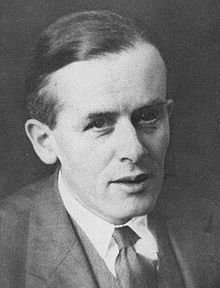Walter Bruno Henning
| Walter Bruno Henning | |
|---|---|
 |
|
| Born |
August 26, 1908 Ragnit, East Prussia |
| Died | January 8, 1967 (aged 58) Berkeley, California, USA |
| Nationality | German |
| Occupation | Philologist, linguist |
| Known for | Contributions to the study of Middle Iranian languages |
Walter Bruno Henning (August 26, 1908 – January 8, 1967) was a German scholar of Middle Iranian languages and literature, especially of the corpus discovered by the Turpan expeditions of the early 20th century.
Walter Henning was born in the ancient fortress town of Ragnit, then in East Prussia, but grew up in Köslin, in Pomerania on the Baltic coast.
Henning initially attended the University of Göttingen to study mathematics, and although he would soon choose to study Iranian languages instead, he would maintain an interest in mathematics for the rest of his life. At Göttingen, Henning was—together with Paul Thieme, Walther Hinz, Kaj Barr and Hans Jakob Polotzky—among the last group of students of Friedrich Carl Andreas, chairman of the faculty for West-Asian languages, acknowledged authority on Middle Iranian literature and guiding force behind the analysis of the Turpan manuscripts.
In 1931, Henning received a Ph.D. summa cum laude for his study of the Middle Iranian verb as it appeared in the Turpan collection. In 1932, the Prussian Academy of Sciences appointed Henning editor of the Manichaean manuscripts of that collection, for which Henning shifted to Berlin.
Between 1932-1936, Henning completed several studies that Andreas had begun, the results of which were published as the 3-volume Mitteliranische Manichaica aus Chinesisch-Türkestan. Independently of Andreas' Nachlass, Henning published Ein manichäisches Bet- und Beichtbuch, the first major publication of the difficult Sogdian language texts. In the same period, Henning also made several significant contributions to the understanding of the history of Manichaeism.
...
Wikipedia
